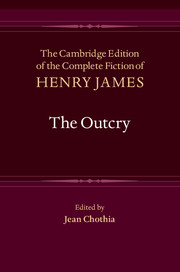Book contents
- Frontmatter
- Contents
- Illustrations
- Acknowledgments
- Abbreviations
- General Editors’ Preface
- General Chronology of James’s Life and Writings
- Introduction
- Textual Introduction
- Chronology of Composition and Production
- Bibliography
- The Outcry
- Book First
- Book Second
- Book Third
- Glossary of Foreign Words and Phrases
- Notes
- Textual Variants
- Emendations
- Appendices
Appendix A - Henry James on The Outcry
Published online by Cambridge University Press: 11 April 2021
- Frontmatter
- Contents
- Illustrations
- Acknowledgments
- Abbreviations
- General Editors’ Preface
- General Chronology of James’s Life and Writings
- Introduction
- Textual Introduction
- Chronology of Composition and Production
- Bibliography
- The Outcry
- Book First
- Book Second
- Book Third
- Glossary of Foreign Words and Phrases
- Notes
- Textual Variants
- Emendations
- Appendices
Summary
Henry James's Notebooks are collected in Volume 34 of The Complete Fiction of Henry James. The text of the entry (iv) in this appendix draws on that prepared by the editor of that volume, Philip Horne.
The previously unpublished letters to J. B. Pinker (vi, vii and ix) are published courtesy of the James Estate and the Beinecke Rare Book and Manuscript Library, Yale University.
The letter to Charles Scribner's Sons (x) is published by permission of Princeton University Library: Author Files I, James subfolder: 1911–1914; Archives of Charles Scribner's Sons, C0101, Box 104, Folder 5, Department of Rare Books and Special Collections, Princeton University Library (included here as Figure 1).
All other letters are in the public domain. All letters are sent from Lamb House, Rye, unless otherwise stated.
(i) The dust-jacket of the Methuen Edition of The Outcry, 1911
‘The Outcry’ deals with a question sharply brought home of late to the conscience of English Society—that of the degree in which the fortunate owners of precious and hitherto transmitted works of art hold them in trust, as it were, for the nation, and may themselves, as lax guardians, be held to account by public opinion. The situation represented in Mr Henry James's study of the larger morality of the matter, if we may so call it, and which is the case of a lax rather than a jealous guardian, becomes conspicuous and acute. Hence springs the drama, almost a national as well as a personal crisis—a rapid, precipitated action, moving through difficulties and dangers to a happy issue.
[Published by Edel with the phrase ‘The situation represented in’ omitted (CN 578), and by Supino with the phrase restored (Bibliographical Catalogue, p. 539)]
(ii) 19 July 1909 to Lucy Clifford
… this sacrifice of the very life-blood of one's play, the mere vulgar anatomy and bare-bones poverty to which one has to squeeze it more and more, is the nauseating side of the whole desperate job. In spite of which I am interesting myself deeply in the three act comedy I have undertaken for Frohman—and which I find ferociously difficult—but with a difficulty that, thank God, draws me on and fascinates.
- Type
- Chapter
- Information
- The Outcry , pp. 261 - 268Publisher: Cambridge University PressPrint publication year: 2016

